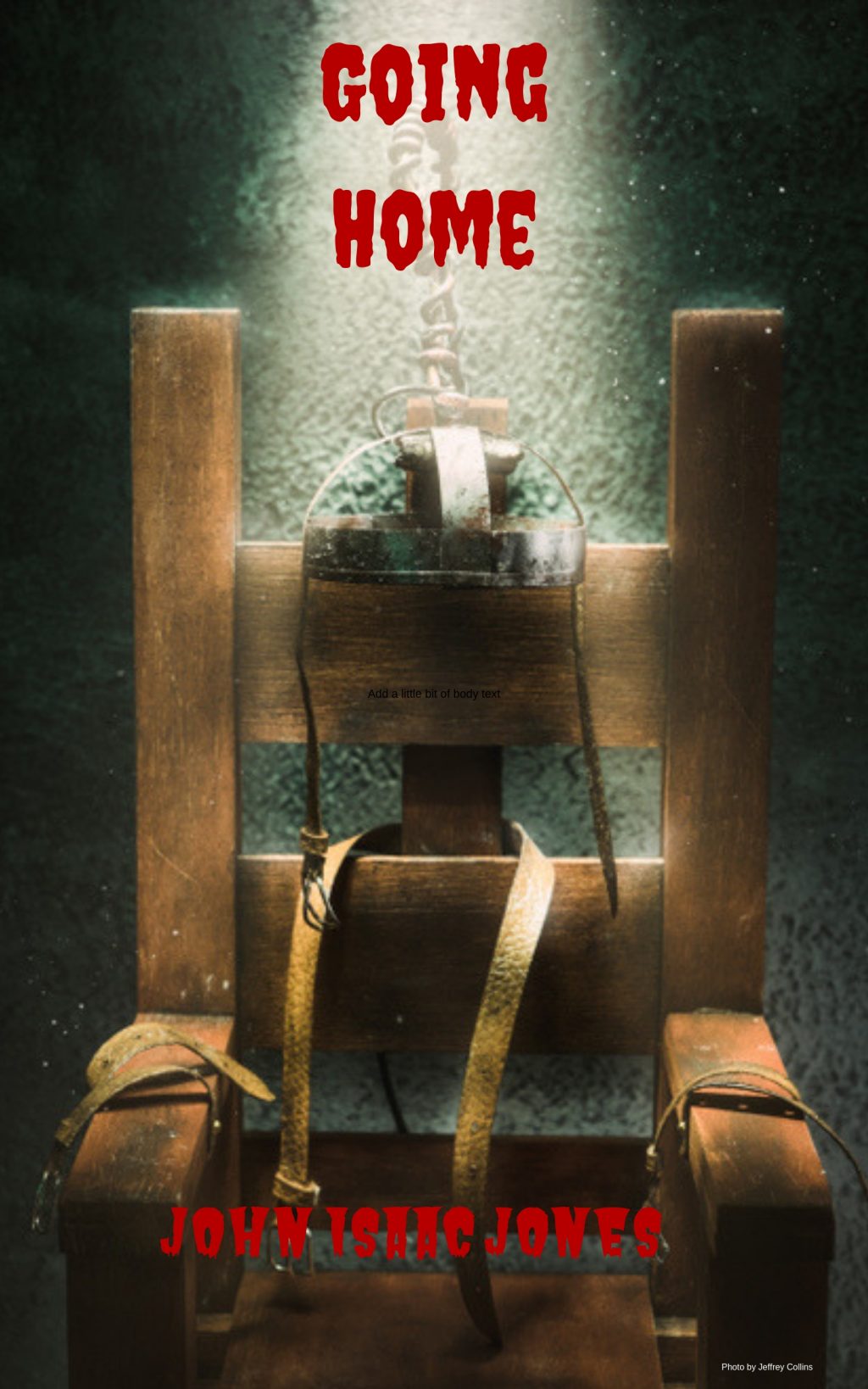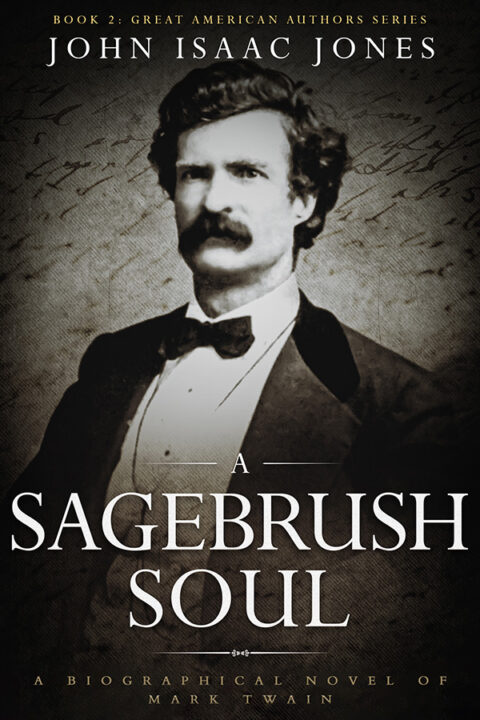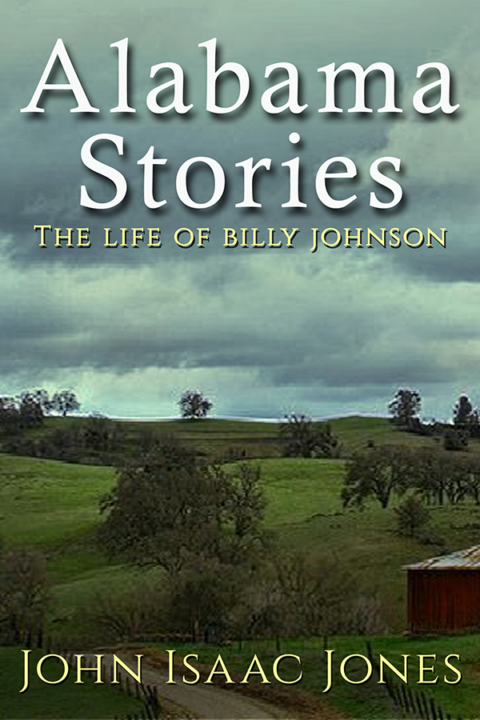This story has been called a “dead man’s dream.”

Going Home
by
John Isaac Jones
Archie was ready to die. At least he thought he was. The sentence had been formally read, he had had his last meal, and the prison chaplain had asked God to have mercy on his soul. Now, as he sat quietly in his cell, the hour was upon him. In the distance, he could hear the doors of the outer cells opening and closing. The warden and his entourage were coming to take him to the electric chair. The sound of rattling keys and the opening and closing of steel doors grew nearer and louder, then he heard the door to the death row cellblock open and a chorus of footsteps tromped across the concrete floor.
With military precision, the entourage stopped in front of Archie’s cell. There was the warden, two assistants, the chaplain, the executioner, and the prison physician. The warden faced Archie.
“Archibald William Johnson?” he asked.
“That’s me,” Archie replied.
With business-like certainty, the warden unfolded an official-looking document. Then, he put on his glasses and began reading.
“The State of Georgia has decreed that you be executed in the electric chair at Valdosta State Prison at midnight on April 23, 1961, which is today. The hour is now approximately 11:35 p.m. Some preparation time will be needed to carry out the court’s order. You must come with us so we may carry out the wishes of the state.”
Seconds later, the two assistants entered the cell, placed handcuffs on Archie’s wrists, and escorted him out. Then the seven men, with Archie in front, started walking out of the death row cellblock.
“Good-bye, Archie,” said Charley Fancher, another death row inmate whose cell was directly across from Archie’s.
Archie nodded at his old friend.
“May God have mercy on you,” said Moses Washington, an older black man, who had been Archie’s best friend during his years on death row.
“Bye, Moses,” Archie said.
“In about fifteen minutes, you gonna be in hell,” said Ray-Ray Hollingsworth, whom Archie had once fought over a piece of cornbread in the prison mess hall.
Archie glanced ominously at Ray-Ray, then acted like he hadn’t heard the words.
The entourage stopped in front of the door to the death row cellblock. The warden unlocked the door, waited for the others to pass, then relocked it. Now the seven men were starting the long walk from death row to the execution chamber.
As the entourage passed through the steel and concrete corridor, Archie tried to appear as brave as possible. At age forty-seven, he was a thin, smallish man—maybe five feet, eight inches—with sad eyes and thinning hair. He had two missing teeth and a slight stubble of beard. Jutting over the collar of his prison uniform, on the right side of his neck, was the top of a cross, a chain-gang tattoo he had acquired as a teenager in the state reformatory. Archie had not been a model citizen. He had been in and out of scrapes with the law for as long as he could remember. At the moment, he had been in state prison for eleven years—eight on death row after he was convicted of murder during the robbery of a convenience store near Albany. Archie and his accomplice had taken just over $1100 in the robbery and were making their getaway when a customer, an off-duty cop, came out of the store and started firing. As the robbers’ car backed up, then swung around and headed for the street, Archie, who was on the passenger side, took dead aim and dropped the cop with a single shot to the chest. Then they sped away.
After almost a year, Archie was captured in Tennessee, then returned to Georgia. In the first trial, there was a hung jury because the state’s chief witness, the clerk, couldn’t remember important details of the robbery. In the second trial, however, a new prosecutor was brought in with a new witness and won a murder conviction. The judge said he had no choice but to sentence Archie to death. There had been too many prior felony convictions and Archie wasn’t showing sufficient remorse. Over the next ten years, Archie’s state-appointed attorneys appealed his conviction all the way to the state supreme court, where it was upheld. With that decision, Archie and his attorneys knew it was only a matter of time before the execution would be held.
Two days before the scheduled execution, Archie had spoken with his lead attorney, who said he had found incriminating evidence against the state’s new witness and had presented it to the court and the governor. The lawyer said he couldn’t make any promises, but there was “a very good chance” that the governor would commute the sentence and grant him a new trial. It was Archie’s only hope.
The group had reached the execution chamber. Once the warden unlocked the door, Archie was led inside and the attendants uncuffed his hands, seated him in the wooden chair, and began strapping him in. Strong leather straps were tightened securely around his ankles, his arms, and his chest. The silver dome was lowered and fitted over his head. Finally, satisfied that everything was ready, the attendants stepped away from the prisoner.
The warden stood in a small alcove in the execution chamber, some ten feet from the electric chair. Behind him was a clock and a telephone. He looked at the clock. It read 11:58. There was a long deathly silence, then, at just after 11:59, the warden looked toward the executioner, who was standing behind the electric chair, his hand on the switch. As the seconds ticked away, the warden started to raise his hand. The executioner put his hand on the switch. Suddenly, the phone rang.
The warden answered the phone.
“Governor?” the warden asked.
All eyes and ears inside the execution chamber turned to the warden.
“Yes,” the warden said. “We’re about to conduct the execution even as we speak….”
For several moments, the warden listened.
“Yes, sir,” he said. “I understand….”
The warden continued listening and said “Yes, sir” another six or seven times. Finally, everyone in the execution chamber could see the conversation was about to an end.
“Yes, governor,” he said finally. “I will see that your instructions are carried out.”
The warden hung up the phone.
“Unstrap the prisoner,” he said. “The prisoner has been given a reprieve. The governor says the chief witness against him has recanted his testimony and the judge has granted a new trial.”
The warden turned to face Archie.
“You’re a free man,” he said. “You’re going home.”
Archie was stunned at the news. It was a miracle. He had given up all hope and now the long and tireless efforts of his attorneys had finally brought some positive results. Archie couldn’t believe he was a free man. And he was going home.
Suddenly, Archie found himself on a bus bound for his hometown of Plum Tree, Georgia. It felt so good to be out. To breathe fresh air, to see green grass and bright sunshine, and be able to swing his arms without fear of hitting an iron bar or a wall. He was anxious to get to Plum Tree. He couldn’t wait to see Main Street and how it had changed over the past eleven years. He wanted to go to the Mexican Chili Parlor and see his sister Mable. He wanted to see his old friends at the pool hall. Then he planned to see Big Betty down at the Morris Hotel. He hadn’t been with a woman in a long time.
Most of all, he wanted to go back to the old family farm and see his mother. She had a spare bedroom and he could sleep all he wanted. She had canned vegetables from the garden and a cow that gave a gallon of fresh milk a day. Oh, how he longed to be in her comforting presence, to see the peacefulness in her eyes, to sit at her table and eat some of her fried peach pies.
Once the bus arrived, Archie, suitcase in hand, wasted no time walking the two blocks to Main Street. There, at the corner of Main and Chestnut, he stopped and looked for the Mexican Chili Parlor. It was gone. There was a hardware store where the restaurant had once stood. He stepped back to the curb and surveyed the entire street. Yes, this was the place, but there was no more Mexican Chili Parlor. Well, so much for my sister, he thought as he continued walking down Main Street. The old five and dime store where Archie had shoplifted marbles and candy and toy cars was still there. There was Snellgrove’s Drug Store, the old Post Office, and Tom Anderson’s Office Supply. At the corner of Main and Fourth Street, he turned right and headed for the Smokehouse Pool Hall.
The moment Archie entered the door, Grady Sizemore yelled, “Archie!”
Suddenly, all the pool players stop playing pool and many stepped forward to greet their old friend.
“When did you get out?” Grady asked.
“I beat a murder rap,” Archie said. “I’m a free man.”
“Well, congratulations,” he said. “Jaybird’s in the back room playing blackjack. He’d love to see you.”
Over the next fifteen minutes, Archie reacquainted himself with his old friends. There was Harry Pickett who Archie had worked with at the Plum Tree Sanitation Department. There was Rusty Walden for whom he had fenced a truckload of stolen men’s shirts down in Florida. Archie was so happy to see Floyd Abernathy, his old friend from high school who had been paralyzed in an auto crash while running from the police after a supermarket heist. There were other old friends—”Big Willie” Wilson, Charlie Dupree, and Tommy Hammock—all of whom he had known since childhood.
Suddenly, the room to the back room opened and Jaybird Watson emerged. Jaybird couldn’t stop laughing when he saw Archie.
“A free man?” he said over and over. “A free man? I can’t believe it. You know there’s something I been wanting to talk to you about…”
With that statement, Jaybird invited Archie to go to the back room so they could talk privately. Several minutes later, once they were seated, Jaybird began.
“There’s a service station in Defuniak Springs, Florida run by an old man,” he said. “He sells gas and diesel fuel to truckers. He sells thousands and thousands of gallons of diesel every day and he always has lots of cash on hand. My friend says he sometimes has $10,000 to $15000 at a time….”
Archie could see where the conversation was going.
“Whoa! Whoa!” he said. “If you’re angling for me to do a job with you, I’m not interested. I’m going straight.”
“Don’t be stupid,” Jaybird said. “It’s just an old man. We could hit him in the head and be gone before anybody knew what happened. There could easily be five or six grand apiece in it.”
“No,” Archie said firmly. “I’m going straight.”
Jaybird shook his head in disapproval.
“You want to have a nip with me?” he said. “I got a fresh pint of Miller’s Hollow moonshine in the trunk of my car.”
“No,” Archie said again. “I quit drinking. I don’t mess with that stuff no more.”
“Just for old time’s sake?” Jaybird asked.
Archie shook his head. He could see that all Jaybird wanted to do was get him in trouble again. Moments later, he said good-bye to his former partner in crime, grabbed his suitcase, and stepped back out on the street. Once outside again, he peered down Fourth Street where, some two blocks away, he saw a sign that read Morris Hotel. Some ten minutes later, he was standing in front of the sign.
He went inside to the desk.
“Who would you like to see?” the clerk asked.
“Big Betty,” Archie said.
The clerk seemed surprised.
“Big Betty?” he said. “We have several girls that are much younger than her.”
“No, I want to see Big Betty,” Archie said firmly.
“Okay,” the clerk said. “That’s six dollars for the room and twenty-five dollars for Big Betty.”
Archie plunked thirty-one dollars cash on the counter and the clerk handed him the key.
“That’s room 241,” the clerk said.
The moment Archie opened the door, Big Betty stared at him as if she had seen a ghost.
“Archie,” she said. “What happened? I thought you were a goner! I read in the papers they were sending you to the chair. How’d you get out?”
After several minutes of explaining about his reprieve, Big Betty was ready to get down to business.
“Okay,” she said. “Get those clothes off. I’m going to make a new man out of you.”
Archie loved being with Big Betty, even though she was in her late forties now. She had gained some weight in recent years, and the wrinkles around her lips were deeper now, but she was a woman who truly knew her business. She had great hands and she knew how to use them. Also, she took pride in her work. “I know how to satisfy a man,” she had once told him. “Any man…”
As promised, Archie was a new man when he walked out of the Morris Hotel. Back out on the street again, he hailed a taxi.
“I’m going to the Chalfant farm,” he told the driver.
Outside of town, he glanced out the cab window at Plum Tree High School where he had attended classes off and on for almost eleven years. There, many years ago on the front lawn, he had fought Harold Bowling over an ice cream cone until the principal had separated them. The old sycamore tree—much larger now—stood in the corner of the playground where he had played softball and horseshoes and tag with his classmates. There was the high hill made up of Georgia red clay overlooking the playground where Archie and his friends would slide down the hill on cardboard boxes after a rain. Moments later, he saw the windmill on the old Chalfant farm and he knew he was nearing his destination. The cab stopped, Archie got out and paid the driver.
As the cab pulled away, Archie instinctively peered across a pasture through a thicket of pines and sweet gums at the old family farmhouse some one hundred yards away. This was where he had grown up. This was the world of his childhood. Then, suitcase in hand, he started walking down the dirt road from the highway to the farmhouse. As he walked, he realized he had forgotten how much he loved South Georgia in late April. Birds were singing, dogwoods were in bloom, yellow honeysuckle hung in heavy pods along the fences and hedgerows, and the entire countryside was rife with vibrant greens and yellows.
Suddenly, he stopped. There, to his left, overgrown with weeds and blocked by a fallen tree, was what remained of the old path to the river. It was down this path he walked hand-in-hand with Maynelle Thompson many, many times. He was seventeen, she was sixteen, and he vividly remembered the Sunday afternoon they walked down that very path to the river, went skinny-dipping, made love, and professed their eternal devotion to one another. Eight months later, however, after Archie was sent to the state reformatory for stealing a car, she visited him and told him she was going to marry Hollis Whisenant. Hollis had a steady job at the mobile home manufacturing plant, she said, and he wanted to make something out of himself. It was nothing personal, Maynelle explained, but she wanted a man with a future.
Now Archie was walking past the waving, amber fields of broom sage where he and his cousins had played cowboys and Indians and caught lightning bugs. As he rounded a bend in the road, he glanced toward the vegetable garden. There was his mother tilling the soil with a hoe. She was hilling pole beans.
“Mama!” Archie called.
The old woman slowly raised her body, pushed her glasses up on her nose, and turned to the direction of the sound. A huge smile burst across her face.
“Archie!” she yelled. “Is that you?”
“It’s me, mama!” Archie yelled back, and then he watched as his mother came running between the rows of okra and tomatoes and sweet corn as fast as her heavy frame would allow. It was so good to be home. So good to find some peace and comfort and security for a change.
Finally, she had reached him and mother and son clasped one another with all their might. As he looked into his mother’s face, huge tears were rolling down his cheeks. Somehow, some way, in his hearts of hearts, he knew he would never look into his mother’s eyes again.
Finally, Archie released the embrace and wiped away the tears.
“Come on,” his mother said. “Let’s go to the house. I just made some fresh peach pies.”
Those were the exact words Archie wanted to hear.
Moments later, he was seated at his mother’s table. First, she served him a glass of cold cow’s milk. Then she turned and started to the stove. With absolute pure lust, he watched as she took down the warm, cloth-wrapped peach pies from the oven. Moments later, she delivered two of them on to the plate in front of him. Archie, not wasting any time, quickly sliced up the two half-moon fruit pies and dabbed them with huge chunks of fresh cow’s butter. He watched the butter melt, slowly and surely, into the flaky pieces of pie, waiting for each dwindling chunk of butter to ooze into the innermost crevices of the crust and filling so that, at just the right moment, he could luxuriate in that perfect bite. Seconds later, that moment arrived. Archie took a bite and closed his eyes. He felt the savory warmth of the melting butter and fresh peach course across his taste buds. Oh great God, he thought, this has to be the most wonderful taste in all the world. Archie felt like he had died and gone to heaven.
Just as he was feeling the full rush of the warm, buttered peach pie, his entire body suddenly convulsed like a clenched fist as 120,000 volts of electricity surged through his every vessel, organ, tissue, muscle, and sinew. His chest thrust violently forward; his arms and legs twisted desperately against the leather straps. Then, a blinding streak of hot light flashed fatally across his consciousness. Everything was dark and silent.
With a nod of his head, the warden signaled for the prison physician to do his duty.
The medical officer, who was wearing a stethoscope, stepped forward and examined Archie for respiration, pulse, and heartbeat.
Moments later, having finished his exam, he turned to the warden.
“The prisoner is dead,” he said.
**The End**
**This yarn is included in my short story collection titled “Thirteen Stories.” The collection may be purchased here: https://tinyurl.com/23cdwrvh





